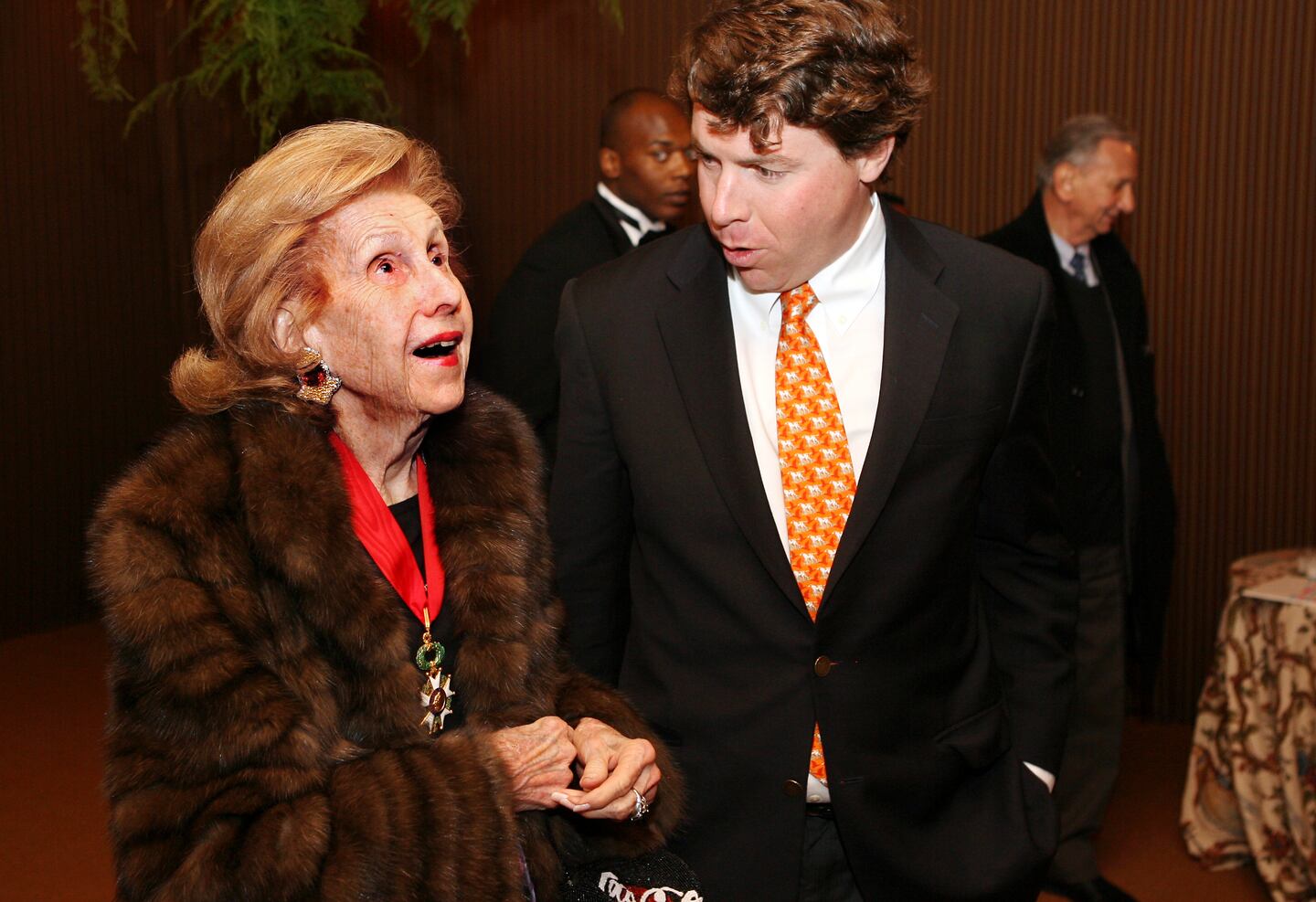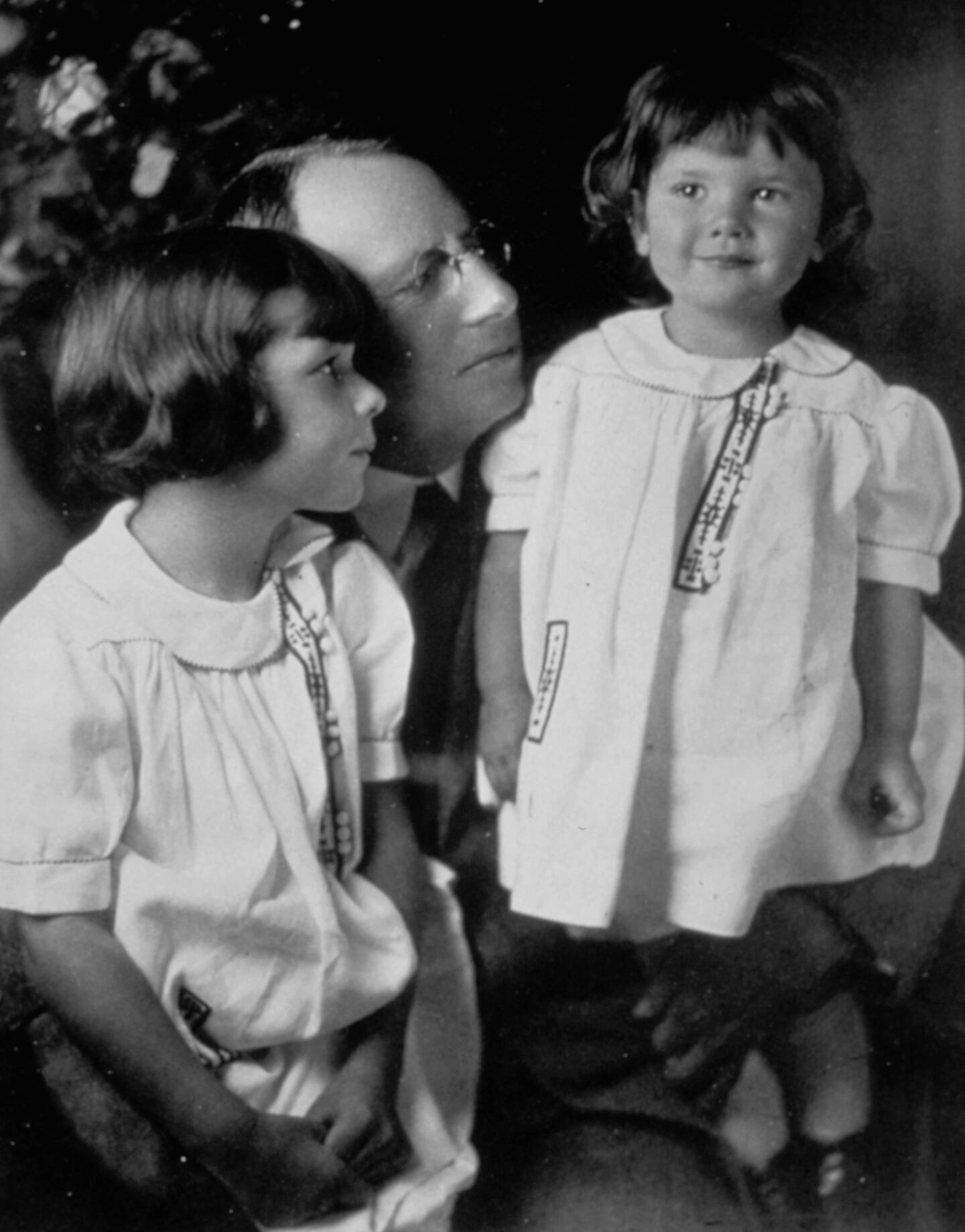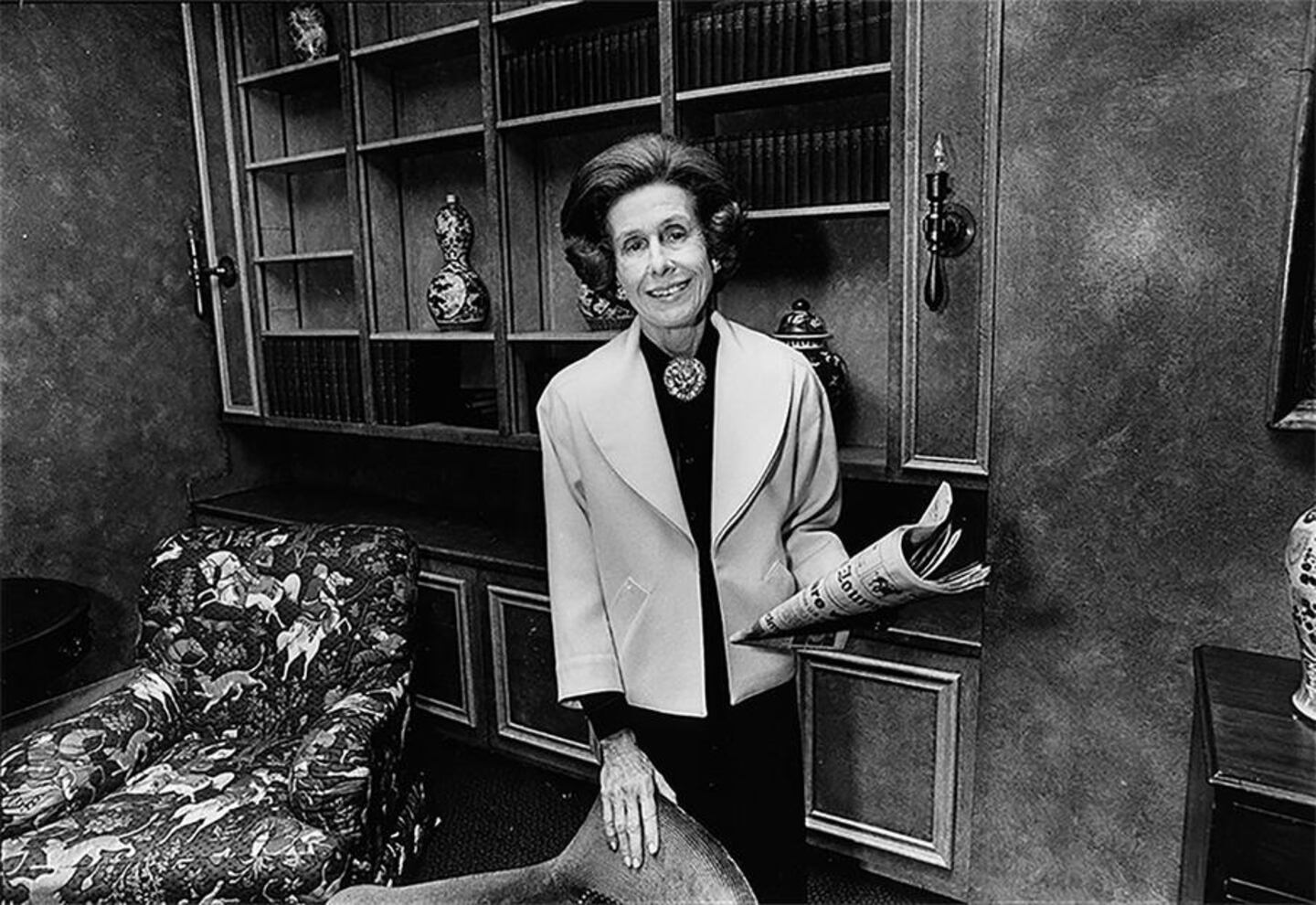Anne Cox Chambers exerted worldwide influence as a diplomat, political activist and philanthropist, but she never forgot her roots in Dayton.
Chambers, the last surviving child of three-time Ohio Gov. James M. Cox Sr., founder of Cox Enterprises, died January 31 at the age of 100.
“We have lost the closest living memory to Gov. Cox, who was certainly an Ohio icon and a Dayton icon,” said Brady Kress, president and CEO of Dayton History.
Chambers and her late sister, Barbara Cox Anthony, always had a special place in their hearts for Dayton, according to Former Dayton Daily News publisher Brad Tillson. “The Cox sisters took an active interest in what was being considered in business matters and the same with philanthropic issues,” Tillson said. “Dayton benefited greatly from being the place where it all began.”
During her long, remarkable life, Chambers served as ambassador to Belgium during the Jimmy Carter administration and was awarded the French Legion of Honor. She could claim two American presidents as family friends.
Yet her family said that Chambers would want to be remembered as someone who enjoyed life’s simple pleasures, such as spending time in her beloved gardens at home and abroad, visits with family and friends and enjoying her dogs.
“She would want to be known for being a person who cared about her home, someone who cared about making the world a better place in her own way,” said her grandson Alex Taylor, president and CEO of Atlanta-based Cox Enterprises.
While serving as ambassador to Belgium in 1977, Chambers told the Dayton Daily News “I never worked so hard in my life.” She said she inherited her drive and her work ethic from her father. “Daddy was this way,” Chambers recalled. “He never went on vacation until he was in his 80s.”
It all began in 1898 when James M. Cox Sr., an Ohio schoolteacher, drummed up $26,000 to purchase the Dayton Evening News Publishing Co., now the Dayton Daily News.
Today, Kress noted, “It would be hard to find too many places around the globe and not be touched by all the products for which Cox was responsible. That’s in large part due to the ways that she and her sister grew the company. She should be celebrated for being part of keeping the company on course.”
“A kind and gracious woman”
It’s a tribute to the Cox children, Kress said, that the company has prospered so much since the patriarch’s death in 1957: “It’s nice to see a success story where the children carry on their father’s tradition and grow numerous times what they were given. You don’t see it often enough. Too often the second generation wreaks havoc on the company and the fortune.”
Recalled Dayton attorney Bob Bartlett, longtime legal counsel for the Cox family, “She was a very kind and very gracious woman, and, even though she left Dayton early in her life, she always remembered her roots in Dayton.”
Chambers shared stories about her childhood during a visit to the Dayton Daily News in 2004. Recalled former Dayton Daily News editor Jeff Bruce, “When Mrs. Chambers visited the Dayton Daily News at its historic location at Fourth and Ludlow streets, she regaled us with stories of growing up in the governor's mansion at Trailsend. We sat in the governor's library and she clearly enjoyed being back at the newspaper where Cox Enterprises got its start. It was very neat to visit with her in that setting.”
Bruce added, "All of us who have worked at Cox newspapers are fortunate to have had our company owned by a family that cares so deeply about its employees and about quality journalism. Mrs. Chambers was so charming and kind. She will be deeply missed, but her legacy lives on."
The Cox sisters shared their father’s passion for journalism, Tillson said: “I heard many stories about their interest, not just in the journalistic integrity of newspapers, but the importance of newspapers in their communities.”
“My dearest Annie Bo”
Chambers was born Dec. 1, 1919, to Margaretta Blair Cox and James M. Cox Sr. shortly before her father’s bid for the White House.
The Dayton newspaper had provided the platform from which James Cox later ventured into politics. He served three terms as governor of Ohio and was the Democratic Party nominee in an unsuccessful run for president in 1920. His running mate, Franklin D. Roosevelt, remained a frequent presence in the life of the family and sent a letter of congratulations from the White House when Anne became engaged to her first husband.
Cox may have been a political force and a business titan, but it is clear from his private correspondence – now in the Dayton Daily News materials in the Special Collections and Archives at Wright State University Libraries – that he was also a devoted father. He knew small details of daily life, such as “your little friends Pinkey and Buddy Church were on their way to Florida.”
He addressed letters to “My dearest Annie Bo,” or “My dear little Bobo,” his nicknames for Anne. When she ventured off to Greenwood Camp in Wisconsin in 1929, not quite 10 years old, her father wrote, “Well, I think you have been on my mind almost every moment since you left. Your mother told me you were very brave, and I will not attempt to tell you how proud I was of you for this.”
She wrote back in a childish hand, on pink stationery, “Dear Daddy, I miss you very much. Thank you for the box of candy you sent us.”
Chambers attributed her lifelong love of the land to growing up at Trailsend -- the family mansion in what is now Kettering -- and the many weekends she spent at the “Old Home Farm” in Jacksonburg in Butler County, where her father had been born and raised. Weekends at the farm were spent doing chores. In 2009, Taylor escorted his grandmother when she celebrated her 90th birthday at the Cox Farm that has been in the family since 1820.
As a teenager, Chambers attended boarding schools in Tucson, Ariz., and Farmington, Conn., before entering Finch College in New York City.
On her 20th birthday, Cox cabled his daughter in New York City, “You have always been a sweet youngster, but each year you grow sweeter to me.”
Cox was a doting, affectionate father, according to former Palm Beach Daily News publisher Agnes Ash, who started her career in the Dayton newsroom in the late 1940s. Fondly referred to as “the Governor,” Cox was a daily presence in the newsroom back then. “He was so very proud of those girls,” Ash said. “The Governor told me personally how proud he was of Anne because she was a big wheel in the Atlanta Garden Club, and that was a very difficult society to get into.”
Chambers met her first husband, Louis Johnson, at the star-studded premiere of “Gone with the Wind” in Atlanta in 1939. (Her father was in town to finalize his purchase of the Atlanta paper.) The couple, whose marriage ended in divorce, had two daughters, Margaretta Johnson Taylor of New York, and Katharine Johnson Rayner of New York.
She later married Robert W. Chambers, a former owner of the Parks-Chambers clothing stores in Atlanta. The couple, who divorced in 1981, had a son, James C. Chambers of New York.
Political activism
Although Chambers shared her father’s interest in politics, she did not become politically active until the mid-1960s, when she met an ambitious young state senator from Plains, Ga.
By the time Jimmy Carter became governor in 1971, their friendship had blossomed. Because the Governor’s Mansion on West Paces Ferry Road in Atlanta had no swimming pool at the time, Carter would take his young daughter, Amy, across the street to splash in the pool at Chambers’ home, Rosewood.
Former President Carter called Chambers a great friend. “When I ran for governor, she gave us the greatest contribution I received,” he said during a 2014 interview to discuss his grandson Jason Carter’s bid for the same office. “She's one of the finest people I've ever known.”
Former Atlanta Mayor and U.N. Ambassador Andrew Young was another beneficiary of Chambers’ political involvement.
“She (was) a staunch Democrat who supported me and my campaigns,” he said. “She's supported people she believed in but never in big, public ways. She operated very much below the radar.”
In addition to backing Democratic candidates financially, Chambers, at age 84, walked the streets of her former hometown of Dayton on behalf of presidential candidate John Kerry.
And at 89, Chambers knocked on doors and passed out fliers in a number of states on behalf of Barack Obama’s 2008 presidential campaign. At one stop in Virginia, a homeowner threatened to get his gun when Chambers walked up with an Obama flier in hand.
Her support of Democrats was not blind, however. “She was in a rage with (President Bill) Clinton,” said the Rev. Austin Ford, a longtime friend. “He lied, and she said that people who have to raise children and grandchildren can’t put up with public officials who lie.”
Because Chambers’ allegiance to the Democratic Party was widely known, politicians and her newspapers’ readers sometimes assumed her views were passed down to editors and opinion writers. That was not the case.
It puzzled many people, for example, that she allowed editors to advocate for Carter’s defeat when he made his first bid for the Governor’s Mansion. She once told an interviewer that she would never force an editor to support a candidate.
“You can’t have a strong editor and do that,” she said.
Tillson said he appreciated “the Cox family philosophy of letting local managers do their jobs and supporting them in every way possible. For a newspaper publisher, it was an ideal circumstance that I got to do my job knowing that if issues arose I would have supportive owners.”
Concurred Ash, “She was greatly admired for letting professional people do their jobs. I never received any directives from her, either in Dayton or Atlanta or Palm Beach. Never did she put her own cause forward by using the pressure of the newspaper. No one was told whom they should endorse. Her silence spoke more than volumes. She gave someone a job and trusted them to do it.”
A natural diplomat
After Carter was elected to the White House in 1976, he appointed Chambers ambassador to Belgium.
The nomination initially was greeted with skepticism from some quarters, Ash recalled, but she soon demonstrated her seriousness of purpose: “The pundits asked, ‘Who is this little housewife from Atlanta?’ But President Carter couldn’t have chosen a better ambassador. It wasn’t just a political reward. She was a very disciplined person and very, very serious about it.”
Chambers’ upbringing provided excellent training for the diplomatic life, Ash said: “Her father ran for President and she was involved with politics her whole life. It prepared her very well. The Cox household was quite cozy with the Ketterings and the Pattersons, and it was quite an international set.”
To prepare for the assignment, she read voraciously and polished her French. The posting, from 1977 to 1981, was a seminal event in her life. Belgium’s King Baudouin I presented her with the Order of the Crown, one of the nation’s highest honors.
“She was not trained as a diplomat in somebody's formal diplomatic university, but her style, her class, and her wisdom enabled her to negotiate the European political community,” Young said.
As her ambassadorial assignment drew to a close, she purchased a home in Provence in the south of France, where she spent many months each year. The home, Le Petit Fontanille, was first recorded to an owner in 1350.
She spent many happy hours on the estate’s grounds, growing lavender and olives, which are harvested by raking them from the trees.
“On any given fall day, you’d find her out with a hand rake … up on a ladder,” Taylor said.
“One time we were walking around in her olive garden. I said, ‘Can you just eat it straight from the tree?’ And she said, ‘Sure.’ I bit into it and it was the most rancid thing,” Taylor recalled. “I looked at her and she just giggled. … She loved joking around.”
Chambers’ philanthropy at home and abroad was well-recognized. In 1993, Francois Mitterrand, then the president of France, awarded her the French Legion of Honor. And in 1994, Clinton appointed her to the President’s Committee on the Arts and the Humanities. But she also supported many causes anonymously.
Chambers is survived by three children, four grandchildren, six great-grandchildren, one niece, one nephew, and a host of loving relatives and friends.
Family members said that her love for her parents, siblings and offspring kindled in her a desire to stay true to the Cox family’s commitment to civic duty.
“Her father had big ideas for changing the world,” Taylor said. “She wasn’t a politician, but she carried those same ideas about making the world a better place.”







